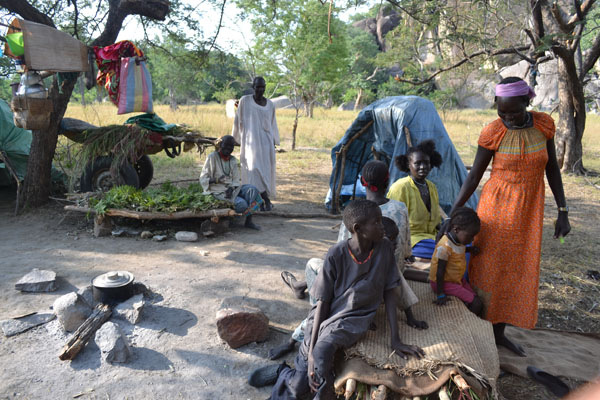
JUBA, South Sudan — As famine or near famine conditions in South Kordofan and Blue Nile set in, the United Nations, African Union, and League of Arab States presented a proposal earlier this month that has the potential to pave the way for international humanitarian aid to reach civilian populations throughout the two Sudanese states. The February 9 “Tripartite Proposal” contemplates the creation of a humanitarian oversight committee—composed of civilian representatives from the three international organizations, the government of Sudan, and the Sudan People’s Liberation Movement-North, or SPLM-N—the formation and deployment of A.U.-U.N.-L.A.S. assessment teams, and the initiation of steps to deliver necessary aid to populations in government and SPLM-N controlled areas.
The proposal, however, stops short of requiring Khartoum to permit international humanitarians into the two states and, indeed, preserves the government’s right, through the Humanitarian Aid Commission, or HAC, to approve all movements of humanitarian staff and cargo into South Kordofan and Blue Nile. As well, the tripartite proposal does not provide for a ceasefire between the government and the SPLM-N, and as a result, the issue of a peaceful negotiation process remains unresolved.
The shortcomings of the proposal aside, the tripartite initiative stands as the most concerted and public attempt on the part of the international community to engage Khartoum in the development of a concrete plan to deliver critical aid to the two states. There is, of course, one problem: The proposal requires Khartoum’s agreement, which, not surprisingly, appears to be long in coming.
Earlier this month, it appeared, at least for a brief moment, that the government might agree to the tripartite proposal. Sudanese Minister of Social Welfare Amira Al-Fadil said that the government would allow some U.N. agencies into South Kordofan and Blue Nile; however, she stressed that these agencies would have to comply with federal and local government directives. There is a prevalent opinion among seasoned Sudan relief workers in Juba that this requirement assumes Khartoum would retain control to whom and where aid would be delivered.
Shortly thereafter, President Omar al-Bashir flatly rejected the idea of permitting “biased” international humanitarian aid organizations into South Kordofan and Blue Nile. So it appears as if the tripartite proposal will face a fate similar to that of so many proposed agreements before it. One minute, a Sudanese government official approves of the text, either through public statements or an actual signature; the next minute, President Bashir simply says, “No.”
President Bashir’s “no” seems all that more definite given that we are, today, fast approaching the month of March, the point at which the Famine Early Warning Systems Network, or FEWS Net, publically predicted that certain parts of South Kordofan and Blue Nile would reach emergency levels of food insecurity. This is one level short of all out famine. And yet there now appears to be no real international consensus around a realistic plan to ensure aid gets to people who are on the verge of starvation. The U.N., A.U., and L.A.S. tried, and ultimately failed, to obtain Khartoum’s consent to a series of concrete steps that would have ensured respect for Sudan’s sovereignty while simultaneously delivering food and medical supplies to civilians cowering from Khartoum’s bombers in the Nuba Mountains and Blue Nile.
The time has now come to do more.
In a letter to U.S. Ambassador to the U.N. Susan Rice, dated February 2, a coalition of human rights groups, including the Enough Project, called on the U.S. to continue diplomatic efforts to secure access to South Kordofan and Blue Nile for international humanitarian agencies, while simultaneously considering options for the delivery of aid to the region without Khartoum’s permission.
In the face of mounting diplomatic failures, the U.S. government and other international actors must now take concrete and concerted steps to ensure the delivery of aid throughout all areas of South Kordofan or Blue Nile, with or without Khartoum’s permission. As Ambassador Rice said at a U.N. news conference on January 17, 2012:
So, we reiterate the call on the government of Sudan to allow full, immediate, unconditional access to all populations in Southern Kordofan and Blue Nile to avert what has the potential for very soon to be a full-scale humanitarian crisis. And obviously, were that not to happen, we would all be gravely concerned and have to review a variety of other options for dealing with the crisis that’s unfolding.
Ambassador Rice, the time for you and your colleagues at the U.N. and elsewhere to review “a variety of other options” is now. This is not to say that diplomacy should be abandoned. Indeed, it should not, particularly insofar as it is designed to reach agreement on a ceasefire between Khartoum and the SPLM-N. Nor should the international community allow a decision to unilaterally deliver aid to the populations in South Kordofan and Blue Nile risk exposing humanitarian aid organizations operating in Darfur to expulsion. The decision is not one or the other, not Darfuris or Nubans. Rather, the decision is to prioritize the safety and security of Sudanese people, wherever they are, above a regime set out to marginalize, oppress, bomb, and ultimately starve them into submission or into fleeing their homelands.
Photo: Civilians displaced by fighting living under trees in Blue Nile (Enough / Nenad Marinkovic)

